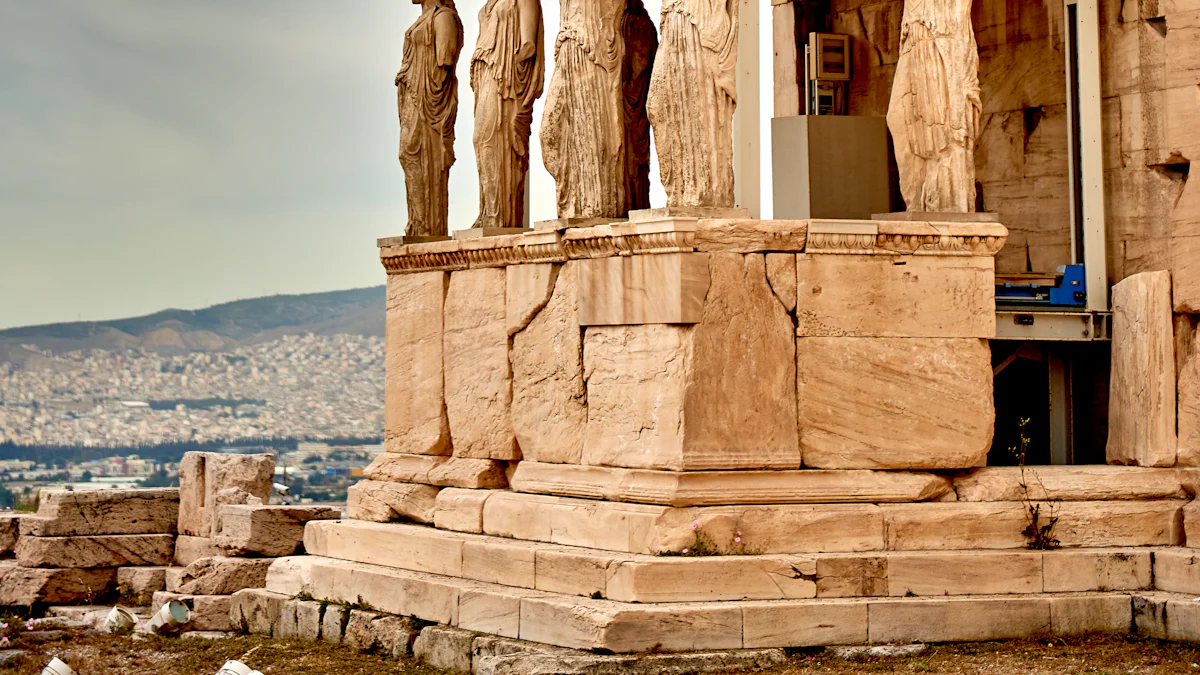Ancient Greece: An Illustrated History

The history of Ancient Greece has profoundly shaped modern civilization. The ancient Greeks made significant contributions in fields such as art, democracy, sports, architecture, theater, philosophy, math, and science. Greek philosophers and leaders left a lasting mark on the Western world. Their breakthroughs in astronomy, medicine, and mathematics continue to influence today’s society. The chronological and thematic exploration of Greece's history reveals the depth of their cultural and intellectual achievements. The legacy of Ancient Greece endures, offering insights into the foundations of contemporary life.
Political and Military History of Ancient Greece

Early Mycenaean Civilization
Origins and Development
The Mycenaean civilization emerged around 1600 BC on the Greek mainland. The Mycenaeans established themselves as a dominant force in the region. The Mycenaeans built fortified palace complexes, such as those at Mycenae and Tiryns. These structures showcased advanced architectural skills. The Mycenaeans developed a writing system known as Linear B. This script was used for administrative purposes.
Key Achievements and Decline
The Mycenaeans achieved significant advancements in trade and warfare. The Mycenaeans engaged in extensive trade networks across the Mediterranean. The Mycenaeans' military prowess was evident in their participation in the Trojan War. However, the Mycenaean civilization faced decline around 1100 BC. Factors such as internal strife and invasions contributed to this downfall.
The Golden Age of Athens
Rise of Democracy
The Golden Age of Athens marked a period of remarkable achievements. The Athenians introduced a new form of government known as democracy. Citizens participated directly in decision-making processes. This system allowed for greater civic involvement. Pericles, a prominent leader, played a crucial role in shaping Athenian democracy.
Major Conflicts and Alliances
Athens experienced conflicts with rival city-states. The First and Second Peloponnesian Wars were significant events during this era. The wars involved Athens and Sparta, two powerful city-states. The conflicts led to shifts in power dynamics. Alliances formed and dissolved as city-states vied for dominance.
Campaigns of Alexander the Great
Conquests and Expansion
Alexander the Great embarked on a series of military campaigns. Alexander's conquests extended the Greek influence across vast territories. Alexander's army defeated the Persian Empire and reached as far as India. These campaigns spread Greek culture and ideas throughout the known world.
Legacy and Impact
Alexander's legacy left a lasting impact on history. The Hellenistic period followed his conquests. This era saw the blending of Greek and Eastern cultures. Cities founded by Alexander became centers of learning and commerce. The Greeks' influence persisted long after Alexander's death.
Cultural Aspects of Ancient Greece

Architecture and Sculpture
Iconic Structures and Styles
Ancient Greek architecture remains a cornerstone of modern design. The Greeks built iconic structures such as the Parthenon and the Erechtheion. These buildings showcased the use of columns, symmetry, and proportion. Greek architects developed three distinct column styles: Doric, Ionic, and Corinthian. Each style featured unique characteristics and decorative elements. Sculptors created lifelike statues that celebrated human form and beauty. Masterpieces like the Venus de Milo and the Discobolus continue to captivate audiences.
Influence on Western Architecture
Greek architectural principles have profoundly influenced Western building design. Modern structures often incorporate Greek elements such as columns and pediments. Public buildings, museums, and government institutions draw inspiration from Greek temples. The emphasis on harmony and balance in Greek architecture resonates with contemporary architects. Greek sculpture has also inspired artists to pursue realism and idealism in their work.
Mythology and Religion
Major Deities and Myths
Greek mythology features a pantheon of gods and goddesses. Zeus, the king of the gods, ruled over Mount Olympus. Athena, the goddess of wisdom, and Apollo, the god of music, played significant roles in myths. Greek myths often included legendary heroes like Hercules and Perseus. Mythological creatures such as the Minotaur and Medusa added intrigue to these stories. Greek mythology has inspired literature and art for centuries.
Role in Society and Culture
Mythology played a vital role in Ancient Greek society. Myths explained natural phenomena and human behavior. Religious rituals and festivals honored the gods and goddesses. Temples served as centers for worship and community gatherings. Greek myths provided moral lessons and cultural values. The influence of Greek mythology extends to modern literature and popular culture.
Drama and Literature
Development of Greek Tragedy and Comedy
The Greeks pioneered the art of drama. Greek playwrights introduced tragedy and comedy as distinct genres. Tragedies explored themes of fate, justice, and human suffering. Comedies offered humor and satire, often critiquing society and politics. The theater of Ancient Greece laid the foundation for modern Western theater. Greek epic, lyric, and dramatic poetry is still read around the world.
Notable Playwrights and Works
Prominent playwrights like Sophocles, Euripides, and Aristophanes shaped Greek drama. Sophocles' Oedipus Rex remains a classic example of Greek tragedy. Euripides' Medea delves into themes of revenge and betrayal. Aristophanes' comedies, such as Lysistrata, used humor to address social issues. Greek literature has heavily influenced modern Western theater and culture.
Ancient Greece made significant contributions to modern society. Greek philosophers laid the foundations for Western philosophy. Greek thinkers influenced logic and science. Greek mathematicians like Pythagoras shaped mathematical concepts. Greek leaders introduced democracy, impacting governance. Greek architects created structures that inspire modern design. Greek scientists explored astronomy and medicine, influencing scientific knowledge. Greek mythology enriched literature and art. Greek civilization continues to shape contemporary culture and knowledge.
See Also
Illustrated History of Ancient Rome
Illustrated History of Ancient Egypt
Definitive Visual Guide to British and Irish History

